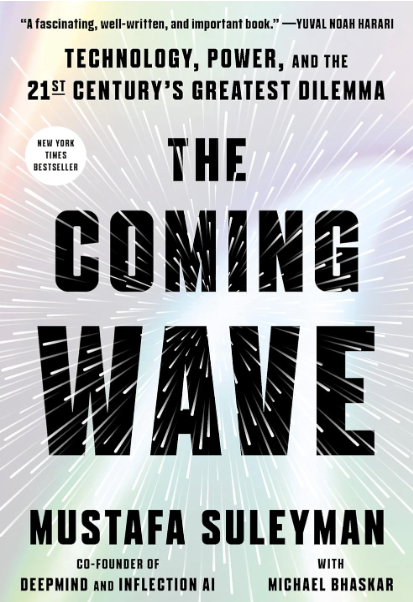I’ve been writing about Artificial Intelligence for over 10 years. The field of AI research dates to the 1950’s. Advances in the field over the years since have accelerated as the costs of computing power decreased. The public’s awareness of AI was accentuated by the free access to ChatGPT a year ago.
Last month, I published an article about the news about Artificial Intelligence (AI) that I received through email over a two day period. I thought I would perform a similar review of recently received emails as well as a few selected LinkedIn posts from friends, and sort them in categories like those I organized for last month’s news.
AI in Teaching
Stanford University’s Graduate School of Business and the Institute for Human-Centered AI have created CRAFT (Classroom-Ready Resources About AI for Teaching).
CRAFT “is a collection of co-designed free AI Literacy resources about AI for high school teachers, to help students explore, understand, question, and critique AI.” It intentionally pursues a multidisciplinary approach to enable all educators to teach about AI.
A few of the lesson plans developed include:
- Where in the World is AI Around Me?
- What the World Looks Like to an Algorithm
- Does Face Recognition Have Racial Bias?
- How Can Bias Get Hidden in Data?
- How Can Scientists Use AI for Whale Songs?
- Can AI Tell Good Online Reviews From Bad Ones?
- What’s a Prompt for AI Image Generators?
- What Are Some Examples of AI-generated Images?
- Can Humans and AI Make New Images Together?
If anyone decides to use one of these resources, I’d like to hear how useful it was.
Arizona State University published a news article about its usage of AI in a virtual reality lab used to teach languages. The article features the work of Emilia Gracia at
ASU Global Launch. Ms. Gracia collaborated with ImmerseMe to provide the tools to create an innovative class curriculum to instruct international students on English as a second language.
A network of public high schools in New York City (Urban Assembly) is working with the American Institutes of Research to develop an AI-powered tool that can help analyze videos of teachers delivering lessons and offer feedback. Proponents say the technology can improve the quality of teaching. Teachers are concerned if the technology will be able to “capture the subtle classroom interactions, how useful the data will be, and whether it will be skewed by biases.
Urban Assembly schools are already using instructional coaches to review classroom videos. However, the process is cumbersome and not able to scale. The development of the tool is with the intention of using AI to interpret and scale the review process, not to eliminate instructional coaches.

AI Threats
Foreign Affairs’ reporters Jen Easterly, Scott Schwab, and Cait Conley produced an excellent article titled Artificial Intelligence’s Threat to Democracy. The three reporters posit that “the ability of generative AI to create new text, images, and other media out of existing data – is one of the most – disruptive technologies in centuries.” Specifically cited as outside actors with a reason to undermine U.S. democracy are China, Iran, and Russia.
An important recommendation of the reporters is that “generative AI companies should consider how they can support election officials, both by ensuring the overall secure design of their products and by developing methods for identifying AI-generated content.
AI in Writing
Jane Rosenzweig published a blog article titled Four Rules for Writing in the Age of AI. The link has the longer article. Her four rules are:
Rule #1: Understand how LLM’s work. She provides four articles that she recommends that her writing students read about LLMs and then write essays about what they learned.
Rule #2: Recognize when writing is thinking. Make sure you know what you might be missing by not doing the writing yourself.
Rule #3: Use writing feedback carefully. If you are not confident that you understand what will make your writing stronger, you should not be relying on a chatbot for writing feedback.
Rule #4: Resist the idea that outsourcing your thinking is inevitable. The process of writing multiple drafts turns into a process of thinking more clearly. Where’s there’s value in that, you should continue doing your own writing.
ChatGPT and Other LLM News
The New York Times sued Open AI (parent of Chat GPT) and Microsoft this week alleging copyright infringement in the training of the LLM. It’s been noted that OpenAI has been negotiating settlement agreements with several large content providers. Evidently, the New York Times was not satisfied with their proposals. If the lawsuit is successful, it could be a setback for the widespread adoption of Chat GPT and other LLMs.
Productivity Tools Using AI
The National Association of Certified Valuators and Analysts (NACVA) published an article titled Using Artificial Intelligence Tools in Professional Report Writing. The authors of the article reported that the biggest weaknesses of ChatGPT are bias and inaccuracy.
One of the articles the researchers asked the tool to write incorporated a citation of an article that never existed. The article was so well written that had the researchers not contacted the journal for verification of the article, they would not have known that it was fictional. Their experience highlights the importance of fact-checking ChatGPT or any AI tool when it is used for writing professional reports.
The researchers also recommend that AI users understand the licensing and usage rights associated with these tools before incorporating AI content in professional writing. They also recommend that business valuators and forensic accountants validate the accuracy and reliability of AO-generated content as well as establish clear guidelines for its use in a practice.
New Books on AI

authored by Mustafa Suleyman. Suleyman was the co-founder of Deep Mind. The book was listed as a best book of the year by CNN, The Economist, Bloomberg, The Financial Times, The Guardian, and CEO Magazine among others.
AI Research
Outgoing Southern New Hampshire University President Paul LeBlanc announced that he is stepping down from his role as president in June. Because he passionately believes that AI has the potential to disrupt education, he plans to work with a team of researchers to study emerging AI trends, impacts on education, and opportunities to innovate. He indicated that AI-induced changes will require educational institutions to reimagine how they assess student learning and grapple with implications for privacy and data security. “AI will do to knowledge work – or white collar jobs – what automation did to blue collar jobs.”
Forrester announced the results of a custom study commissioned by Dataiku. The title of the report is Accelerate Generative AI Development. More than 200 AI decision makers at large companies in North America were surveyed for the report. There was nearly unanimous agreement (97%) that Generative AI is either critically, highly, or moderately important to organizations’ business strategies in the next 24 months. 64% of the businesses surveyed are already using Generative AI to enhance customer experiences.
California State University, Sacramento has launched a new AI Institute in Education. The institute will “encourage reimagining coursework utilizing AI to boost the success of underserved students and establish programs to share resources, ethical guidelines, and research on AI with other educators in K-12 and higher education.
New Jersey Governor Phil Murphy announced that the state is working with Princeton University to establish a hub for artificial intelligence activity in the state. The hub will be a collaboration between the university, the governor’s office, and the New Jersey Economic Development Authority. The hub will collaborate with other New Jersey universities, community colleges, and vocational schools.
Inside Higher Ed reported about a Grassroots initiative to accelerate AI in Africa. The 2023 Southern African Conference for Artificial Intelligence Research was held in Muldersdrift, South Africa in December. Unlike the U.S. where big tech advances AI or the UK where the government supports many AI initiatives, a grassroots coalition of AI students, professors, researchers, industry practitioners, and entrepreneurs are supporting the advancement of AI across the continent.
Betterworks published a survey titled How the Workforce is Responding to Generative AI Challenges and Opportunities. The company surveyed more than 1,000 employees representing 20+ industries in the U.S. to understand AI usage and employee sentiment.
The survey surfaced four major points. 1) Organizations need to act with urgency to enable employees to use GenAi in a structured and safe way. 2) Employees believe that AI can improve DEI. 3) AI +HI (human intelligence) is the right solution for removing bias while incorporating human judgement in performance reviews. 4) Employees want more communications from HR around AI, the organization’s use of it, and how it may impact employees’ jobs.
Webinars and Conferences
Last chance to register for the January 10th free 1 hour webinar from AAC&U titled AI and Higher Education: Implications for Learning, Curricula, and Instruction.
Proposals for presenting at this year’s Distance Teaching & Learning Conference (DT&L) in Minneapolis on July 22-24 are due by January 12. There are two themes relevant to AI. Generative Artificial Intelligence (AI) in Teaching and Learning and AI in the Administration/Management of Online Enterprises. The conferences’ two major sponsors are UPCEA and the University of Wisconsin at Madison.
The US Distance Learning Association is closing its call for proposals for its 2024 conference. Proposals are due on January 14th for the conference that is scheduled in St. Louis on June 17-20. The theme where AI related proposals are encouraged is Innovative Techniques and Technologies.
WCET is hosting a 3 hour webinar on February 22 titled Elements of Practice + Policy of AI in Education. $75 for first attendee from an organization. $25 for additional colleagues. Sessions will cover:
- Emerging AI tools
- Trends in teaching, learning, and usage in higher education.
- Effective practices across the institution.
- Model policies and the case for and against institution-wide policies.
- How institutions are using AI tools in meaningful and innovative ways.
- Equity and access considerations.
D2L is offering a free course called Introduction to AI Ethics and Governance. The course is self-paced and self-directed. It’s three modules take 40 minutes to complete. The course is available until December 31, 2024.
Section is offering a free webinar on January 9 titled Can AI Be Contained? The webinar features a conversation and Q&A between NYU Stern Professor Scott Galloway and Inflection AI co-founder Mustafa Suleyman.
Future of Work
An 11-minute podcast on NPR titled You Don’t Think AI Could Do Your Job. What If You’re Wrong? Ari Shapiro speaks with NPR’s Andrea Hsu on how people are adapting to AI in the workplace and ways to approach the technology with a plan instead of panic.
Morgan Stanley published an article titled Generative AI is Set to Shake Up Education. Key takeaways are:
- AI could ultimately improve access and quality of education.
- Education technology companies have opportunities from generative AI that markets may be missing.
- Generative AI could bring $200 billion in value to the global education sector by 2025.
- Reskilling and retraining alone could require $6 billion in investments by 2025, with edtech companies poised to fill that need.
Supreme Court Chief Justice John Roberts wrote in his annual report “predicts that judicial work – particularly at the trial level – will be significantly affected by AI.” Judges won’t be replaced by AI but will have to be aware of how it operates (avoid hallucinations) and how it may impact access and affordability of law services for the poor.
Final Thoughts
One of my resolutions for 2024 is to spend more time using AI apps like Chat GPT as well as attending webinars and conferences with AI-related topics. I’ll try to create a summary like this once a month. Meanwhile, all of the literature that I read indicates that any white collar worker who ignores the technology does so at their professional peril.











